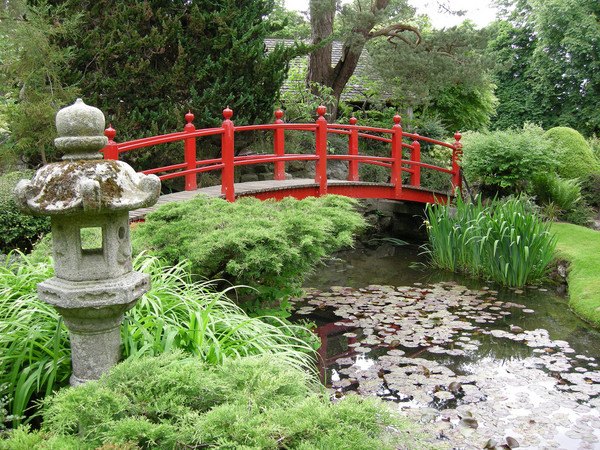Swimming In The Pond Of The Japanese Garden
In some ways my initial move across the Pacific was a lot easier than my return. I was at the end of my personal rope when I went to Japan in 1999 and, even though I was stepping into a dead end job, there was nowhere to go but up. Coming home was quite the reverse. Of course I had a job offer, but I had learned the hard way about birds in the hand versus the two in the bush and, truth is, I was scared. I had carved out a nice little life for myself in Japan. I had friends, a decent place to live and, for a change, money in my pocket. I had even purchased a car and a motorcycle, but now it was time to sell out and move on.
The car in question was my 1986 Twin Turbo Supra and it was in great shape. In the two years I had owned it I had taken good care of it, corrected a few minor paint issues with rubbing compound and special wax that turned the paint back to its original brilliant white, added new tires, a kick ass stereo and even completed the shakken. Back home in the States a similar car would have sold for several thousand dollars and there was no way I could have lost money, but in Japan, as usual, it was a different story.
Someone once told me long ago that Japan is like the pond in the center of a Zen rock garden. From the outside it looks tranquil, placid and is a perfect reflection of the sky above. Underneath, however, everything that happens in every other pond is taking place. Bugs are laying their eggs, frogs are eating the bugs and the fish are eating the frogs. The entire circle of life is going on under that water and it isn’t until you decide to plunge in that you really understand how deep and how murky the pond really is.
The Japanese, as I had learned during my initial purchase of the Supra, don’t generally do person-to-person sales of used cars. Sure, you might sell a vehicle to a family member or a good friend, as I discovered when I sold my Mazda MPV to my “Japanese family” when I left Okinawa in 2010, but selling a used car to a stranger is practically unheard of. I’m not sure if anthropologists have ever conducted a study as to why this is the case, but rumors about the Japanese belief in evil spirits attaching themselves to things that others have used in a personal way aside, I think it is because public transportation is nearly universal, parking is limited and cars are expensive to own. The result is that young people don’t need to own a car to get around and, thanks to all the fixed costs of car ownership, are effectively priced out of the market. Therefore, most cars are purchased by adults who can and usually do buy new because of status issues, increased reliability and other benefits given to new cars under the shaken inspection system.
The average Japanese person trades in their old car when they buy a new one. The money they receive in trade is ludicrously low, but given that most people don’t have the need, desire or even the extra space to keep an older car it works out well. Sure, like anyone who trades in a car they lose out on some money, but they are essentially paying for the convenience of disposing their old car. I had learned, however, that a little elbow grease and an unconventional approach could often circumvent the natural way of things in Japan and so I determined to turn to the “international community” for a solution.
There are quite a few foreigners in Japan. The vast majority of them are tourists, then in decreasing frequency come the international students on exchange trips, the Mormon missionaries, the JET teachers, company-men on temporary assignments and finally the dregs of Western society that end up as ESL teachers at for-profit English conversation schools, spouses of Japanese citizens and all the other flotsam and jetsam of the world that get swept into the relatively sheltered waters of Japan and end up staying there for years at a time. As with many communities that fail to fully integrate into their host countries, Westerners in Japan have built for themselves a vibrant and fun sub culture all their own and all it takes to access it is the time and willingness to sit down in an Irish pub and listen to people who have no intention of ever returning to their home countries bellyache about how much they hate Japan.
About a month before I returned home I put an ad in the local Gaijin (foreigner) classified ad paper, known as the Kansai Flea Market and waited for the calls to roll in. I got some quick bites on my bike and sold it after just a week at a small profit, but the car languished in the paper and generated just one call from an Australian bloke who was hoping I knew about any laws that might prevent him from taking it home. As my departure neared I checked with my girlfriend’s friends to see if any of them wanted it and was given a resounding “no” by everyone we asked. Finally I decided to take it to a place called “Gulliver” that ran frequent ads on TV about buying used cars.
In retrospect I should have probably guessed that any company that has the money to run almost constant ads on TV wouldn’t pay much for the cars they bought, but when the guy told me my car was so old that they would only take it for free I wasn’t very happy. Still, as the time for my departure was drawing ever nearer, I went ahead and struck the deal and told him I would bring the car back the next day. Of course one thing led to another and I didn’t bring the car back until the following week but since I was giving it to them who would have thought it would be an issue? Well it was, and imagine my surprise when the guy told me that because I had failed to honor my word and bring the car the next day the terms of the deal had changed. Now, instead of simply giving them my car, they wanted me to pay them $50 to take it. I wasn’t happy, but with my tickets to go home in hand, I went ahead and paid the money and bade my Supra farewell.
Had I known that I would eventually get the job of my dreams, marry my Japanese girlfriend and end up living in the same region of Japan just three years later, I would have paid up my parking fees in advance and let the car sit until my return. But at that point in time, with the future still uncertain, I know that it was better that I let the car go. Still, whenever I visit Japan and return to my “hometown,” I feel a sudden flash of shame and anger every time I drive by that shop. I know I was cheated and, frankly, it grates on me. Of course, outside of a snarky article on a car blog, I will never exact revenge. Still, it’s nice to think that someday, maybe someday, I will.
Thomas M Kreutzer currently lives in Buffalo, New York with his wife and three children but has spent most of his adult life overseas. He has lived in Japan for 9 years, Jamaica for 2 and spent almost 5 years as a US Merchant Mariner serving primarily in the Pacific. A long time auto and motorcycle enthusiast he has pursued his hobbies whenever possible. He also enjoys writing and public speaking where, according to his wife, his favorite subject is himself.
More by Thomas Kreutzer
Latest Car Reviews
Read moreLatest Product Reviews
Read moreRecent Comments
- Varezhka Maybe the volume was not big enough to really matter anyways, but losing a “passenger car” for a mostly “light truck” line-up should help Subaru with their CAFE numbers too.
- Varezhka For this category my car of choice would be the CX-50. But between the two cars listed I’d select the RAV4 over CR-V. I’ve always preferred NA over small turbos and for hybrids THS’ longer history shows in its refinement.
- AZFelix I would suggest a variation on the 'fcuk, marry, kill' game using 'track, buy, lease' with three similar automotive selections.
- Formula m For the gas versions I like the Honda CRV. Haven’t driven the hybrids yet.
- SCE to AUX All that lift makes for an easy rollover of your $70k truck.





































Comments
Join the conversation
Silly question: Why could you not just abandon the car and leave?
fascinating, i know some of those dregs you mention. There are quite a few brazilians of japanese descent in japan. They generally hate it and can't wait to come back home. Looking like the locks you'd eXpect them to have an easier time of it than other gaijin but that doesn't seem to be the case.